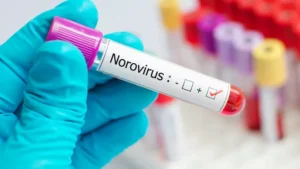Norovirus Outbreak in the US: Symptoms and Prevention Tips from Experts
 As respiratory illnesses like RSV, the flu, and COVID-19 continue to spread across the US, another highly contagious virus, Norovirus, has emerged, affecting more people during the holiday season.
As respiratory illnesses like RSV, the flu, and COVID-19 continue to spread across the US, another highly contagious virus, Norovirus, has emerged, affecting more people during the holiday season.
During the week of December 5, reported cases of Norovirus rose to 91, up from 69 the previous week. Last year, the same period saw fewer than 65 cases per week. This increase highlights the need for precautions to avoid contracting this stomach bug, which can drain your energy and leave you unproductive for up to a week. Norovirus can also be fatal for young children, older adults, or individuals with weakened immune systems, so it should not be taken lightly.
Symptoms of Norovirus can appear suddenly and are often severe, including vomiting, diarrhea, stomach pain, and fever. The virus can lead to dehydration and may require hospitalization in severe cases.
“Common symptoms include diarrhea, vomiting, nausea, stomach pain, fever, headache, and body aches. Norovirus can lead to severe dehydration, particularly in young children, older adults, and people with weakened immune systems,” says Dr. Divya Joshi, Consultant Infectious Diseases at Fortis Hospital, Bannerghatta Road.
Is There Treatment for Norovirus?
There is no specific treatment for Norovirus, but managing its symptoms is crucial. Since dehydration is a concern, it is important to stay hydrated by drinking fluids such as water, clear broths, or oral rehydration solutions.
“Hydration is key, as vomiting and diarrhea can lead to dehydration. Rest is also important to help the body recover from the infection,” says Dr. Shroff. After the acute symptoms subside, it’s recommended to gradually introduce bland foods like rice, bananas, and toast, as they are gentle on the stomach and may speed up recovery.
Prevention Tips
To prevent the spread of Norovirus, experts recommend frequent handwashing with soap and water, disinfecting contaminated surfaces, avoiding close contact with sick individuals, and refraining from sharing food or drinks with those who are ill.
“Ensure food safety by cooking shellfish thoroughly, washing fruits and vegetables, and avoiding raw or undercooked oysters to reduce the risk of infection,” adds Dr. Joshi.
Use bleach-based cleaners to disinfect surfaces, especially high-touch areas such as door handles and kitchen counters.
If symptoms appear, isolate yourself to prevent spreading the virus to others. Additionally, avoid cooking for others for at least 48 hours after symptoms have resolved.








